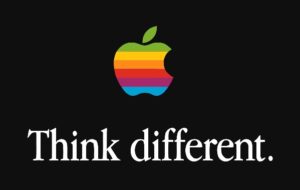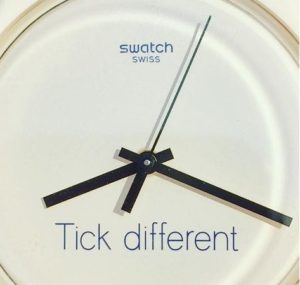The Trial Board of Japan Patent Office (JPO) dismissed an invalidation petition by Swiss watch giant, Swatch against TM Reg. no. 5849925 for word mark “iWATCH” owned by U.S. tech giant, Apple Inc.
[Invalidation case no. 2017-890071, Gazette issue date: January 31,2020]
iWATCH
Disputed mark, consisting of a word “iWATCH” in plain block letters (see below), was applied for registration in the name of Apple Inc. on April 25, 2014 in respect of watches, clocks and other goods in class 14.

Immediately after registration on May 13, 2016, Swatch filed an opposition to challenge registrability of disputed mark based on Article 3(1)(iii), 3(1)(vi), 4(1)(xi), 4(1)(xv), 4(1)(xvi) of the Japan Trademark Law, but in vain. [Opposition case no. 2016-900234]
Article 3(1)(iii) is a provision to prohibit any mark from registering where the mark solely consists of elements just to indicate, in a common manner, the place of origin, place of sale, quality, materials, efficacy, intended purpose, quantity, shape (including shape of packages), price, the method or time of production or use.
Article 3(1)(vi) is a comprehensive provision to prohibit any mark lacking inherent distinctiveness from being registered.
Article 4(1)(xi) is a provision to refrain from registering a junior mark which is deemed identical with, or similar to, any senior registered mark.
Article 4(1)(xv) provides that a mark shall not be registered where it is likely to cause confusion with other business entity’s well-known goods or services, to the benefit of brand owner and users’ benefits.
Article 4(1)(xvi) is a provision to prohibit registration of any mark likely to mislead quality of goods or services.
Invalidation Trial
Japan Trademark Law provides a provision to retroactively invalidate trademark registration for specific grounds under Article 46 (1).
In an effort to argue against the opposition decision, Swatch filed a petition for invalidation against disputed mark on October 23, 2017. Swatch argued disputed mark “iWATCH” shall be invalid because of following reasons:
- Given disputed mark consists of an alphabet letter “i” and a generic term in relation to a designated goods ‘watch’, the mark can be merely perceived to indicate a value, code, type, mode or standard of ‘watch’. If so, disputed mark shall be lack of distinctiveness and revocable under Article 3(1)(vi) in relation to the goods.
- Likewise, relevant consumers would misconceive quality of goods when disputed mark is used on goods other than ‘watch’ in class 14, e.g. jewelry, key holders, jewelry boxes, accessories. If so, disputed mark shall be revocable under Article 4(1)(xvi) in relation to goods other than ‘watch’.
- Disputed mark “iWATCH” resembles “SWATCH” from visual and phonetic points of view. It is unquestionable SWATCH has become remarkably famous for watches and fashion items of Swatch Group. If so, a likelihood of confusion will arise between “iWATCH” and “SWATCH” when disputed mark is used on goods in class 14. Thus, disputed mark is revocable under Article 4(1)(xi).

Board Decision
In the decision, the Board sided with Apple Inc. and found that:
- The Board considers the term “iWATCH” is a coined word in its entirety which does not give rise to any specific meaning at all. Therefore, it is unlikely that relevant consumers conceive disputed mark just as a qualitative indication of goods in question.
- The Board admits “SWATCH” has been acquired a high degree of reputation and popularity among relevant consumers and traders as famous watch of Swatch Group. In the meantime, the term appears less unique and creative since it is a dictionary word meaning ‘a sample piece (as of fabric) or a collection of samples’.
- Difference on initial letter of both marks shall not be negligible on the case. The Board has no good reason to believe both marks are deemed similar from visual, phonetic and conceptual points of view.
- If so, it is unlikely to happen that relevant consumers with an ordinary care would associate or misconceive disputed mark with Swatch or any entity systematically or economically connected with claimant even when used on ‘watch’.
Based on the foregoing, the Board concluded “iWATCH” shall be irrevocable in relation to “SWATCH” and dismissed Swatch’s invalidation petition wholly.


